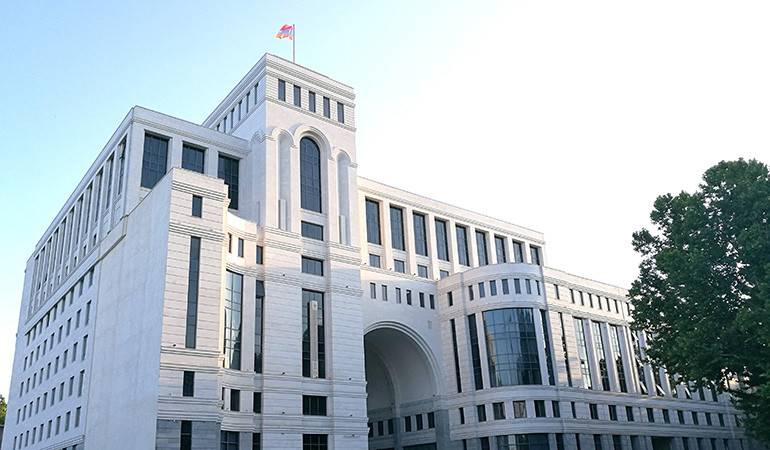Statement of the Ministry of Foreign Affairs on the need to establish an international mechanism in Nagorno-Karabakh
24 June, 2023For building real and lasting peace in the region, Armenia and Azerbaijan should find mutually acceptable solutions to all existing problems in the negotiation process and prevent further manifestations of hatred and enmity.
Those issues equally include agreeing on a solid legal basis for the delimitation of the state border between Armenia and Azerbaijan in accordance with the Alma-Ata Declaration and the latest Soviet maps, unblocking the region's transport infrastructure on the basis of the sovereignty, jurisdiction, equality and reciprocity of the countries as well as clearly guaranteeing the rights and security of the people of Nagorno-Karabakh. At the same time, we are convinced that the best way forward for guaranteeing the rights and security of the people of Nagorno-Karabakh lies in direct and substantive discussions between Baku and Stepanakert with international participation.
Meanwhile, the sincerity and political will of the top leadership of Azerbaijan to achieve peace in the South Caucasus is seriously questioned by the incessant hostility and hate speech from the Azerbaijani authorities, by the provocations, threats to use force against the sovereign territory of the Republic of Armenia and the Armenians of Nagorno-Karabakh. Moreover, Azerbaijan's actions are not only deviating from addressing numerous problems through constructive dialogue with Stepanakert, but also, on the contrary, they are consistently leading to ethnic cleansing in Nagorno-Karabakh.
The latest evidence of this is Azerbaijan's installation of concrete barriers in the Lachin corridor on 22 June and the impediment of any movement of people, goods and transport. As a result, the supply of food, medicine and basic necessities has been completely halted, as has the transportation of critically ill patients, even by the International Committee of the Red Cross. In parallel gas and electricity supplies to Nagorno-Karabakh have been cut as a result of the illegal blockade of the Lachin corridor for more than six months. The targeting of citizens engaged in agricultural work and sabotage activities of the Azerbaijani armed forces are constant. While the humanitarian crisis is deteriorating, the urgently needed access to Nagorno-Karabakh for international humanitarian and fact-finding missions remains blocked.
In this context, it is also necessary to recall the intimidation of the peaceful population of Nagorno-Karabakh through statements on social media as well as through loudspeakers on the ground, the deliberate disregard of the obligation to ensure the return of displaced persons from Hadrut and Shushi regions, the seizure and total expulsion of Armenians from the settlements of Khtsaberd, Hin Tagher and Parukh after the ceasefire of 9 November 2020, the destruction of Armenian cultural heritage in the Armenian settlements under Azerbaijani control, etc.
These actions are being carried out in defiance of legally binding decisions of the UN International Court of Justice and numerous appeals by the international community. Under such circumstances, the international community cannot turn a blind eye and delude itself that the issues of the rights and security of the people of Nagorno-Karabakh can be addressed without special and urgent international attention, involvement and efforts. It is necessary and vital to address the rights and security issues of the 120,000 Armenians of Nagorno-Karabakh through the Baku - Stepanakert dialogue within the framework of an international mechanism. We consider it necessary to emphasise once again that the Republic of Armenia will continue its sincere efforts aimed at establishment of peace in the region.


